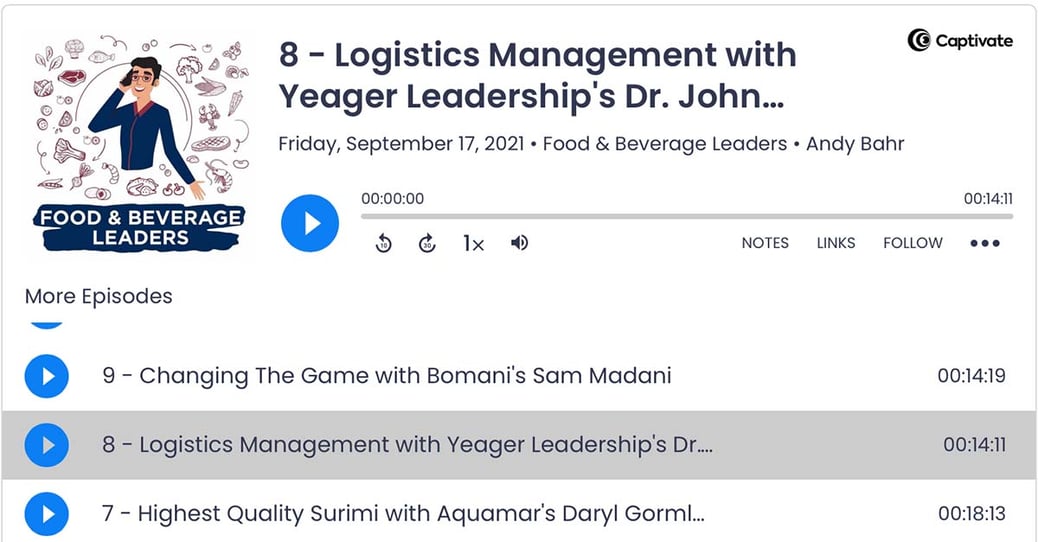Tips to Enhance Your Leadership Style in Uncertain Times
by Bahr Transportation | Sponsored Content, on Dec 22, 2021 8:46:51 AM
Food and Beverage Leaders Podcast Host Andy Bahr sat down with Dr. John Yeager of The Yeager Leadership Group to discuss how logistics and shipping managers can enhance their leadership style to better handle the challenges they face in the workplace.
Logistics managers, shipping managers, production brokers, and salespeople all are facing challenges from daily customer and supplier demands. The COVID-19 pandemic, social issues across the country, the transition to the Biden/Harris administration, natural disasters, and more have made 2021 a year of unpredictability. It left industry leadership wondering what they can do to regain a sense of control and order with their teams.
Yeager said managers with a leadership style that offers flexibility and understanding is best, even in times when you know logic and facts have to take precedent over an emotional reaction.
“Right now we are in a trust market,” Yeager says. “With sales and delivery, sales and production, all the different aspects logistics managers work on...they need to establish trust with the people they work with.”
He said the status of our culture today has people on edge. It’s time for managers to find a new way to re-establish loyalty and offer reassurance.
Yeager says logistics managers already have a good understanding of financial capital, human capital related to knowing the people they serve and lead, and social capital by making sure relationships work well. Now, they need to focus on the concept of psychological capital, a term derived by researchers Fred Luthans and Carolyn Youssef.
Psychological capital is the idea that an individual with hope, efficacy, resilience, and optimism can navigate the negative effects of situations such as a pandemic, disaster, or any other crisis. The four characteristics create the acronym HERO, which is now known as the model for the psychological capital framework.
Yeager explains leaders with an understanding of psychological capital have clear goals, believe in themselves, are open-minded, and adaptable. He said following the HERO model will help logistics managers flourish over time.
“They have confidence and believe they are capable of effective action,” he says. “They can adapt to adversities and grow as they need to for a challenge. Managers need to be optimistic and have a flexible outlook to reinforce taking positive action.”
When Bahr asks what can be said to logistics managers to help ease their concerns about ongoing changes and challenges, Yeager points to having more conversations around workflow balance and leveraging “healthy tensions” within the industry.
Yeager says one outlet to help managers embrace change is to help them recognize that sometimes two polarities with different functions must work together to be successful. “For example, sales and delivery or sales and production. They need to live with each other. If you over-focus on sales and neglect the delivery, there will be a problem. If you over focus on delivery and have no new sales, that will also be an issue.”
He says logical thinking is essential to understanding how to balance the two areas. There needs to be clear communication, a willingness to collaborate, and a positive mindset to get the job done right.
“A polarity for logistics managers with sales, the upside of sales is that you have top-line growth, customer expansion, value creation, market awareness, and stability,” Yeager says. “With delivery and production, in order to get satisfaction by the customers, you need to deliver a high-quality product and to build in repeatable solutions to have happy customers out there. They need to work in and of each other. You have to get the job done. You have to deliver. But you also have to build relationships. If there’s a nanosecond of doubt with relationships, then the job may not get done.”
To stand face to face with today’s culture and workplace challenges, logistics managers have to be willing to shift on a dime. Flexibility will help them get through the uncertainties they may face, and working to maintain their relationships will help them continue to thrive.
About Dr. John Yeager & Yeager Leadership
Yeager Leadership is a leadership management firm that works with corporate, athletic, education, law enforcement, and municipalities to develop skills and strategies to operate as high-performing teams. Yeager Leadership Group Founder & CEO Dr. John Yeager has helped organizations become more aware of how using their ability to leverage strengths and culture can lead to maximizing engagement, capacity, and performance.



